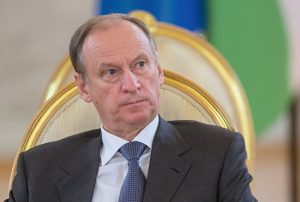Trumps sejr betyder kun en udsættelse af
krigsfaren – med mindre der vedtages en
langt mere fundamental forandring
Leder fra LaRouchePAC, 10. november, 2016 – Donald Trumps valgsejr, og både Hillary Clintons og Baracks Obamas valgnederlag, betyder en kortvarig udsættelse af fremstødet for Tredje Verdenskrig imod Rusland, under forudsætning af, at Obama forhindres i at foretage en eller anden vanvittig handling i sine tilbageværende ’lame duck’-uger – overgangsperioden – i embedet. Det faktum, at en umiddelbar fare for atomkrig midlertidigt er taget af bordet, er vigtigt, men det løser ikke den anden, alvorlige krise, som verden konfronteres med.
Det transatlantiske finanssystem er stadig på randen af total disintegration, og med mindre man omgående håndterer dette problem, vil betingelserne for global krig snart vise sig igen. For at løse denne umiddelbare krise, må den amerikanske Kongres omgående vedtage de love, der er fremstillet i begge Huse, for en genindførelse af den oprindelige Glass/Steagall-lov fra 1933, og som bryder for-store-til-at-lade-gå-ned-bankerne op, i totalt adskilte kommercielle banker og investeringsbanker. Dette må være det første punkt på Kongressens dagsorden, når den vender tilbage til Washington i begyndelsen af næste uge.
Når denne presserende handling er vel overstået, må der træffes yderligere forholdsregler til en ny form for relationer mellem de ledende nationer på planeten. Der er udsigt til en snarlig genoprettelse af de amerikansk-russiske relationer, en mulighed, der blev hilst velkommen af den førende, russiske økonom og rådgiver til Putin, Sergej Glazjev, i et interview torsdag med Itar-Tass. Han advarede ligeledes om, at Obama-administrationens politikker har ødelagt relationen mellem USA og Kina, og at en afspænding mellem Washington og Moskva kan spille en vigtig rolle i at udbedre de skadede amerikansk-kinesiske bånd. Det, der behøves, er en række positivt bekræftende handlinger, der vil være med til at sikre et globalt system for fred og stabilitet. Kinas præsident Xi Jinping tilbød gentagne gange præsident Obama at samarbejde omkring netop disse mål, men Obama afviste alle disse tilbud. Som både ambassadør Chas Freeman (USA’s ambassadør til Saudi-Arabien, 1989-1992) og tidligere CIA-direktør (og Donald Trumps nationale sikkerhedsrådgiver) James Woolsey understregede i udtalelser i denne uge, så må USA rette den tragiske bommert, hvor de har afvist tilbuddet om at deltage i Asiatisk Infrastruktur-Investeringsbank (AIIB) og det overordnede initiativ for Bæltet-og-Vejen (OBOR). Verden må tage en række skridt hen imod et nyt, globalt samarbejdssystem. Lyndon LaRouche understregede torsdag, under drøftelser med medarbejdere, at dette kan gøres, især, hvis nøglenationer kan udvikle samarbejde. Et sådant globalt hovedeftersyn er ikke let, men, med de korrekte rettesnore for at gå fremefter, kan det gøres. Både Lyndon og Helga LaRouche understregede behovet for at skabe et Nyt Bretton Woods-system, der trækker på succeserne fra den oprindelige aftale fra 1944, som Franklin Roosevelt stod for.
Resultaterne af de amerikanske valg har dæmmet op for den umiddelbare fare for atomkrig, men det ville være en alvorlig fejl at sætte sin lid til, at den nu valgte præsident Donald Trump tager de nødvendige skridt. Der er nøglespillere, der kan bidrage til dette nye, presserende nødvendige arrangement, når man kaster et blik rundt på planeten. Tyskland kan spille en sund rolle. Rusland, under præsident Vladimir Putin, spiller allerede en fremragende rolle, og Kina, under præsident Xi Jinping, udgør en betydelig, positiv kraft.
Et område, der er af vital betydning for ethvert fremvoksende, nyt samarbejdsarrangement, er samarbejde om udforskning af rummet, der inkorporerer alle de afgørende elementer, der mangler i andre bestræbelser, der i øvrigt måtte være betydningsfulde.
Mange af de fremskridt, der er så presserende, vil finde sted på lokalt og regionalt niveau; men alle disse indsatser må være i overensstemmelse med en større, global vision. Hvis det mislykkes at gennemføre disse udfordrende, men afgørende handlinger, vil det føre til en endnu større katastrofe, inklusive, at en fare for atomkrig atter vil vise sig. Dette kræver seriøs tænkning fra et bredt udvalg af ledere fra hele verden.
Foto: Den russiske præsident Putin udtrykker Ruslands hensigt om at genoprette relationer i fuldt omfang med USA, under bemærkninger i sin tale i Kremls Store Palads den 9. november, 2016, efter Trumps valgsejr (Foto: kremlin.ru)
 »Den er enkel i sin essens og inkluderer, at international lov har forrang, at en fredelig løsning på konflikter inden for den eksisterende ramme af internationale organisationer, anført af De forenede Nationer, har forrang, at underhåndsaftaler og ensidige handlinger og blokpolitik er uantageligt, og at indblanding i suveræne staters interne anliggender er uacceptabelt«, siger Patrushev.
»Den er enkel i sin essens og inkluderer, at international lov har forrang, at en fredelig løsning på konflikter inden for den eksisterende ramme af internationale organisationer, anført af De forenede Nationer, har forrang, at underhåndsaftaler og ensidige handlinger og blokpolitik er uantageligt, og at indblanding i suveræne staters interne anliggender er uacceptabelt«, siger Patrushev.
 Disse Fire Hovedlove begynder med Glass-Steagall, sammen med en tilbagevenden til et Nationalt Banksystem i Hamiltons tradition, som middel til at udstede kredit til realøkonomien, der som sin spydspids og drivkraft har videnskab, med udvikling af fusionskraft og en genrejsning af NASA og rumforskning og rumfart.
Disse Fire Hovedlove begynder med Glass-Steagall, sammen med en tilbagevenden til et Nationalt Banksystem i Hamiltons tradition, som middel til at udstede kredit til realøkonomien, der som sin spydspids og drivkraft har videnskab, med udvikling af fusionskraft og en genrejsning af NASA og rumforskning og rumfart.